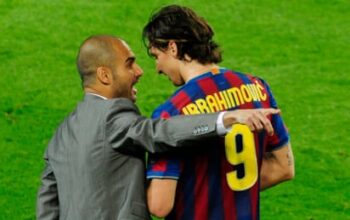There was a moment, at about 5.30pm last Saturday, when there seemed a genuine danger that Manchester United might be turning into a serious football club. But it took only two minutes and the sight of Nikola Milenkovic soaring above Lisandro Martínez for that facade to collapse. Two further weird goals later – the sort of accidents that speak of a profound carelessness – and it was clear that the banter era still has some time to run.
That was only the beginning. By the following morning, Dan Ashworth had been mutual-consented out of the club: five months’ gardening leave followed by five months of actual work, a truly magnificent piece of living satire, even before you consider the compensation United had to pay Newcastle to secure him and the hefty payoff he must have received.
Still, at least United have cash to spare after abolishing concessionary tickets. (Which does make you wonder just what Sir Jim Ratcliffe has against Sir Alex Ferguson: first he scraps his £2m annual stipend and now he can’t even get a pensioner’s discount.)
For a long time, United’s squad has been a bloated mess, packed with an odd mix of emerging potential and fading stars, average players and good players, none of them able to play anywhere near their potential because they have been bodged together with little apparent thought to the overall structure. Ratcliffe was supposed to sort that out, but instead seems to have taken the same principles of squad building into the boardroom: in February he described Ashworth as “clearly one of the top sporting directors in the world”, but then put him in charge of transfers, which has never been his speciality.
Ashworth likes to sit at the centre of what he calls his “wheel”, liaising between the coach and the heads of recruitment, the academy and other departments. He believes in consensus, when seemingly Ratcliffe wanted somebody more overtly decisive. But even had personalities gelled, what could the United wheel look like, and how many hubs would it have had, when United also have a hands-on chief executive in Omar Berrada, a director of recruitment in Christopher Vivell, a director of sport in Sir Dave Brailsford and a technical director in Jason Wilcox? You wait years for some vaguely titled guiding hand to come along and shape overall philosophy and suddenly a dozen come along at once.
It was the Irish journalist Dion Fanning who coined the term “politburo of bullshit” for the gaggle of earnest men staring impassively down from the stand at Old Trafford on another shambles. After the defenestration of Ashworth, the directors’ box at Old Trafford during matches will come to resemble the party balcony overlooking the May Day parade in Moscow, as Kremlinologists try to divine minute shifts in the political landscape from the positioning and body language of the grey-faced leaders gathered there.
The Berrada-Wilcox axis, seemingly, is waxing and brought in Ruben Amorim against the advice of Ashworth, who would have preferred somebody with Premier League experience, somebody who didn’t play a back three – for if there is one thing that does link this squad, it is that it is not set up for 3-4-3.
Meanwhile, it feels a long time since Brailsford seemed a titan of the sporting world, marginal-gaining Team Sky to meticulously planned and functional cycling victories. He now appears like one of the spin gurus imposed on Peter Mannion in later episodes of The Thick of It, humoured because it would be too embarrassing to admit they are paying a fortune for the Emperor’s New Hypoallergenic Pillows.
It is easy to mock, but there is a more serious point here. United have become a vision of modern capitalism, the Succession-isation of society. While directors jostle and plot with their enormous salaries and payoffs, 250 staff are laid off, Christmas bonuses are cut, packed lunches for match-day staff abolished, free coach travel to cup finals is discontinued and ticket prices are hiked. Ratcliffe regularly references his upbringing in a council house in Failsworth yet, while those lower down the pyramid are squeezed and any shred of employer generosity stripped away, the elite go on bungling, wasting millions and being rewarded for it.

But somehow, despite the dysfunction, the sense the Ratcliffe revolution is already corrupted, United head into Sunday’s derby at the Etihad in better form than Manchester City and with a greater sense of optimism. For City, there is the dreadful thought that, while form may at some point return, it is also possible something has gone terribly, irrevocably awry, that suddenly the days of glory are over.
United, given football’s lingering belief in the messianic capacities of managers, can hope Amorim may somehow be able to turn things around, even if his early energy seems already to have faded. Given the problems at both clubs, the derby could be a clown-car rally, hooters hooting, honkers honking, water squirting from buttonholes as parts clank off all over the pitch.
after newsletter promotion
The effect of the new manager bounce has not entirely dissipated for United. Although André Onana is going through one of his phases of baffling haplessness, and although there have been mystifying brain freezes from a number of players, there are some positive signs.
Amorim has been direct and admirably frank about the scale of the difficulties he faces, trying to impose a new method on a squad unused to it and seems to be struggling to deal with the physical demands it imposes. Certain in-game substitutions may seem odd, explicable only because they are being made not for the match in which they occur but to manage workload given the rigour of the training programme.
Which all seems to make sense: short-term pain for long-term gain. The situation is bad enough and Amorim new enough in the job that there is an understanding there will be no immediate solutions. The promise of jam tomorrow is at least plausible. But at some point the vast nomenklatura of directors (and fans) are going to want clear evidence the jam is in the process of manufacture, that the fruit and the sugar aren’t being squandered as they have been for much of the past decade.
The great bureaucracy demands quotas must be met; there are bonuses to be paid.
Source: theguardian.com


